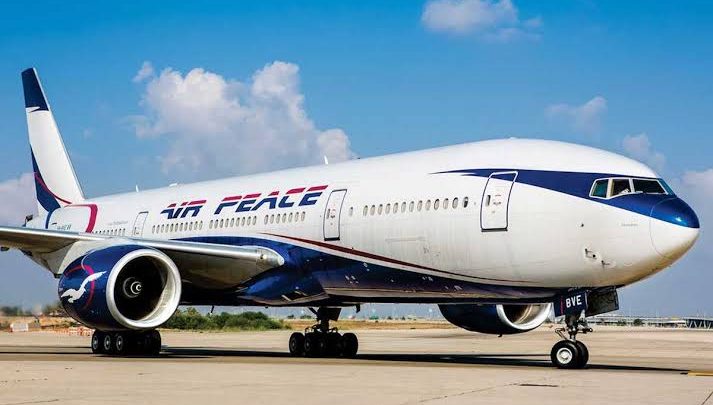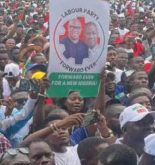For a second year running, Air Peace tops Nigeria’s most delayed flights
For the second year in a row, Air Peace has the most delayed flights in Nigerian airports in 2022. This is a trend analysis based on the fact that in 2021, Air Peace, Dana Air, and Max Air had the most flight delays in Nigerian airports.
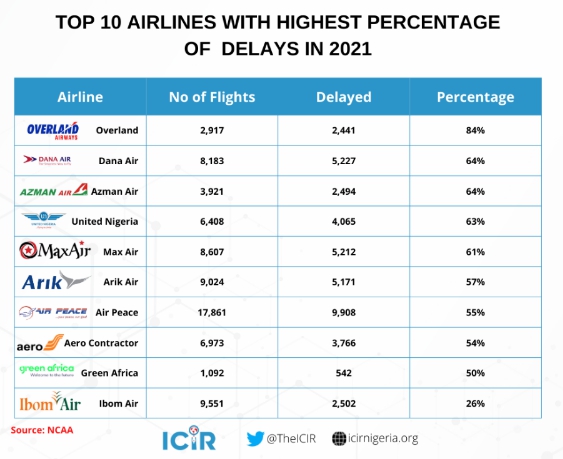
Also in 2022, Arik Air and Max Air were named as the airlines with the most delayed flights at Nigerian airports by volume, following Air Peace.
However, in terms of the number of flights completed by a carrier during the year versus the number of delays, Overland tops the chart at 84 percent, Azman Air came in second at 69 percent, and United Nigeria Airlines and Arik Air came in third and fourth with 66 percent, respectively.
Dana Air had 65 percent, Max Air had 64 percent, Aero Contractor had 61 percent, Air Peace had 61 percent, Green Africa had 45 percent, Ibom Air had 32 percent, and Value Jet has a 26 percent.
According to the Nigerian Civil Aviation Authority’s (NCAA) Annual Report on International and Domestic Flight Operations 2022, a total of 80,328 flights were operated on domestic routes, while 13,003 flights were operated on international routes.
The report showed that 47,144 flights were canceled in 2022 on domestic routes, representing 59 percent of such flights.
With 24,449 flights, Air Peace had the most in the country, with 14,908 of those flights experiencing delays.
Arik Air came second with a total of 9,759 flights with 6,440 delayed, while Max Air came third with 9, 671 operated flights out of which 6,189 were delayed, and United Nigeria Airlines came fourth with 6,097 flights with 4,000 experienced delays.
Ibom Air operated 10,910 flights, with 3535 flight delays. Dana Air operated 4,440 flights, with 2,906 flights delays, while Azman Air operated 3713 flights, with 2,555 delayed flights.
Similarly, Overland Airways operated 2926 flights, with 2,451 flight delays, but Green Africa operated 4648 flights, with 2,111 delays, while Aero Contractors operated 3106 flights, with 1889 of the flights delayed. Newcomer, Value Jet operated 609 flights with 160 of them delayed.
Infographic of 2022 delayed flights in Nigeria
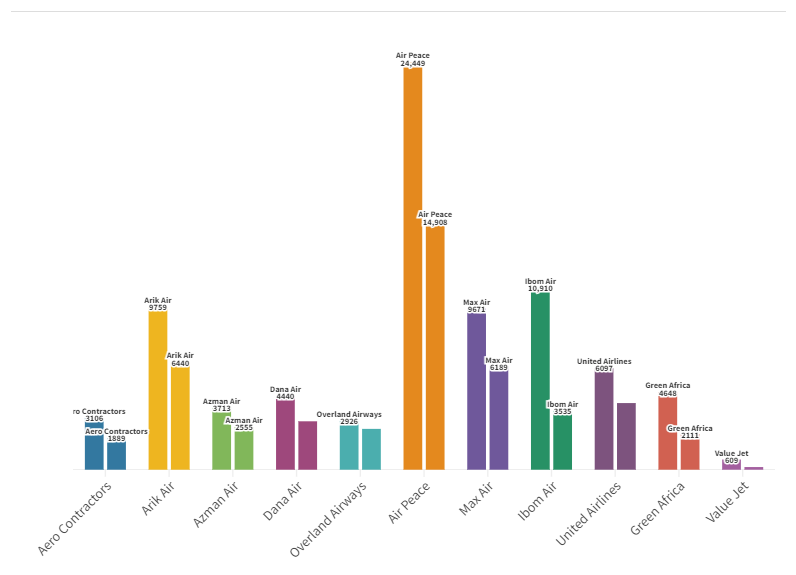
All the eleven airlines suffered 795 cancellations in 2022, with Max Air having 174; Air Peace, 129; and Arik Air, 110.
Air Peace issues regular flight updates
Owing to the general backlash over its operations, Air Peace has been issuing daily flight updates this month, highlighting its daily setbacks.
Most of the updates on social media from last December till March 2023, signed by its management, have blamed flight delays and cancellations on low visibility, fuel scarcity and operational concerns from the Federal Airport Authority of Nigeria (FAAN).
For instance, in December 2022, the airline canceled numerous flights blaming the scarcity of aviation fuel and poor weather. On December 7, 2022, it informed customers of multiple delays due to the issue of aviation fuel scarcity and on December 8, 2022, it diverted its Lagos/Uyo flight to Port Harcourt on the basis of bad weather.
On December 9, 2022, it did the same, for its Lagos-Port-Harcourt and Abuja-Port-Harcourt flights. In the New Year, the practice did not abate as the airline recovered from poor weather conditions and website downtime, but still delayed more flights.
A spokesperson for the airline, Stanley Olisa in an exclusive interview said the Air Peace does not deliberately delay flights and, however, blamed it on other factors.
“Air Peace does not deliberately delay flights. We will never do that. There are a number of factors that engender delays, arising from unfavorable weather, unexpected operational and technical issues.
“Not forgetting that the industry also faced a protracted Jet A1 fuel scarcity, which seriously impacted flight operations. And considering the size of our operations, over 100 flights daily, the fuel scarcity did create multiple disruptions across our network.
“Flight delays disrupt passengers’ travel plans but we assure the flying public that we are doing everything we can to give each customer a seamless experience on our services.”
The Air Peace conundrum is not unconnected with the fuel queues in the country and the continuous hike of aviation fuel prices which jumped up to as much as N840 earlier in March, a situation which the Airline Operators of Nigeria worried may lead to flight delays.
How other airlines fared
Value Jet, a relatively newcomer is the only airline to have delayed fewer flights at 26 percent. The airline delayed 160 flights, out of 609 total operated flights; a metric which is scary considering the fact that it began to operate just in 2022.
Ibom Air delayed 3, 535 flights out of 10, 910. The airline, known to have one of the best on-time flight schedules released its performance for the month of February 2023 where it attained 84 percent schedule reliability and 87 percent on-time performance. Out of 764 flights, 125 were rescheduled, 23 merged while 96 were delayed beyond 15 minutes.
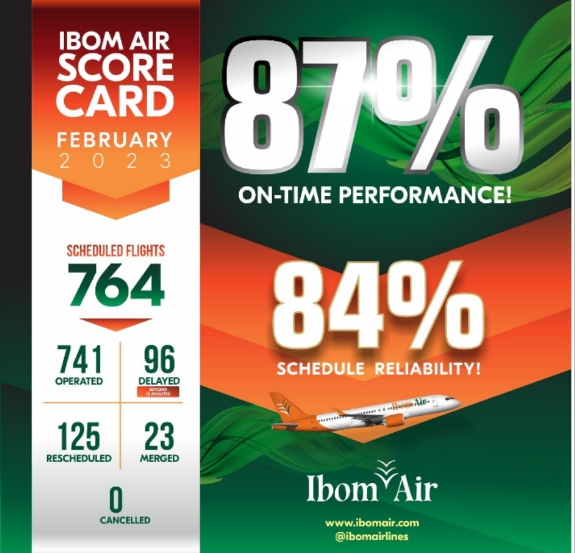
Dana Air and Aero Contractors, on their own part, suffered regulatory actions due to the safety and sustenance of their fleet. Aero contractors announced its temporary suspension of services in July, 2022, blaming the harsh climate for air operators, forced to contend with high maintenance costs, high cost of aviation fuel, inflation and forex scarcity, among other issues.
It, was away from four months, between August through November 2022. It resumed flights in December 2022.
Similarly, Dana Air was grounded in July 2022, after which it resumed in November 2022. The NCAA grounded the airline following the outcome of a financial and economic health audit, which revealed that the airline was no longer in a position to meet its financial obligations and to conduct safe flight operations.
Quite recently, the Dana Air revealed that it had taken some of its aircraft from maintenance and also introduced on their website, a flash sale of N45, 000 for those who plan their trips early enough.
The statement signed by the Head, of Corporate Communications, Kingsley Ezenma said the aircraft had undergone proper maintenance in line with strict safety standards, documentation and certification.
On its part, Green Africa Airways, which is no longer a newcomer in the sector, has adapted to the delays like its counterparts. It recorded 50 percent of flight delays on 2021, and in 2022, it had 45 percent, an improvement of just five percent.
Olumide Ohunayo, an aviation consultant, blamed the airlines for their poor performance, particularly in managing delays, and urged them to improve their product offerings.
“Delays have cost the industry a lot of money. These affect the airlines and passengers and when you put it together you are looking at billions of dollars lost to delays, according to a recent survey.
“The Spring Alliance was principally meant to save passengers from getting stranded at the airport. Individual airlines still need to work out modalities that would make their flight from departing on time. Unfortunately, it was a very poor result.
“The airlines were guilty; the bigger ones were even guiltier but even the smaller ones like Green Africa that were able to make some headway. We need to continue with naming or coming up with weekly statistics so that we can put the airlines on their toes and other allied aviation agencies on their toes.
“The recent one had to do with presidential elections and an airline had to fly to Togo to land before the VIP movement was cleared. They finished the second runway and now we have closed the international runway. International flights will suffer more delays and they have to taxi a longer distance before they can fly out.
“There are other factors like the airlines themselves, the airport services, delays caused by airport unions strike and ground handling services,” Mr. Ohunayo said.
While delays cannot be eradicated, he argued that by publishing the number of delays, the public will hold airlines and other aviation agencies accountable.
“As at the moment, everyone is involved: the runways, the airport security, the conveyor belt, all contribute to it and we need to get them addressed one way or the other. If we begin to embarrass the industry by bringing the delay statistics to the public, everyone would work on how to resolve them,” he explained.
The NCAA’s General Manager, Public Affairs, Sam Adurogboye, confirmed that there are laid down sanctions for every kind of violation, during an exclusive interview with our
“There are laid out sanctions for every violation. In this case of delays, sanction is applied only when it is established that the reasons for the delays are not tenable in law. But if the delays are as a result of bad weather or technical issues that bother on safety, then no sanction.”
Previous efforts of lawmakers
In the past Nigerian lawmakers have made efforts to curb the consistent flight delays by airlines operating in the country but not much has changed.
In 2022, for instance, the Chairmen of Senate and House of Representatives committees on Aviation, Smart Adeyemi and Nnolim Nnaji, respectively, dismissed the excuses for flight delays and cancellations as not “totally genuine.”
Mr. Adeyemi said, “We are inviting all the airlines, the director-general of NCAA, service providers and stakeholders. We are going to look at the Civil Aviation Act with a view to doing something about it urgently.”
The lawmaker censured at all the carriers for allegedly hiding under the excuse of “bad weather and operational reasons” to cause hardship and pain to travelers.
In response to the Senate Committee’s concerns, the Airline Operators of Nigeria (AON) listed 16 reasons for flight delays and cancellations.
AON’s officers, Yunusa Abdulmunaf Allen Onyema and Shehu Wada listed the causes in a statement they jointly signed.
Weather, inadequate aircraft parking space, restrictions caused by sunset airports, delays due to VIP movement, frequent bird strikes and foreign object damage (FOD) make up some of the reasons.
Others are unavailability and the ever-rising cost of aviation fuel; unavailability of forex for spare parts and maintenance, delays from the Nigeria Customs Service (NCS) in the clearing of safety-critical spare parts, poor air traffic flow, and inadequate check-in counters.
Delays will always be there in the aviation space but one way we can minimise them is to consistently publish the statistics on a monthly or weekly basis for the general public in a bid to put the carriers and other stakeholders on their toes.

